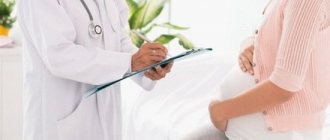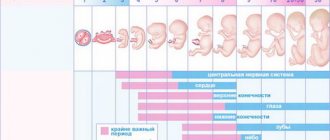There are probably no more amazing and vivid feelings in the world for a woman than those she experiences while expecting a baby. An extravaganza of emotions arises from the very first moment, when she only holds the treasured test with a trembling hand and accompanies her right up to the birth.
The word extravaganza is used here for a reason, because emotions are not always rosy - in addition to happiness that a woman will become a mother, there is often fear, worry and anxiety - what if something goes wrong? Any uncomfortable sensations in the stomach frighten the expectant mother to horror, but often they are caused by problems with the intestines.
Why does my intestines hurt during pregnancy?
Cramping pain in the abdomen during pregnancy, in most cases, indicates that the intestines hurt. This problem becomes more pronounced, because the first thought that comes to a woman’s mind is that maybe the pregnancy is going wrong? This, in turn, leads to additional stress on an already fragile nervous system. Is it worth it to be so nervous? We need to figure it out.
Due to bloating of the large intestine and, as a result, strong muscle tension, spasmodic pain occurs in the abdomen, which I call colic. As a rule, this happens due to poor nutrition, as a result of which a fermentation process can occur in the body, as well as due to various diseases of the digestive system.
In pregnant women, intestinal colic can also be caused by another process - the migration of an egg into the uterine cavity. A characteristic feature of this process is that the intestines hurt during early pregnancy - literally a few days after conception occurred. That is, a woman at that time may not even suspect that she will have a child. In addition, hormonal changes may also be to blame for everything that is happening, because from this moment all the most important events will develop here, the work of the whole organism will be aimed at the future person.
The rapid development of the fetus and its constant growth leads to the fact that the lower abdomen begins to prick more and more often. In addition, this can often lead to bleeding. If colic accompanies a woman constantly and is accompanied by hemorrhage, she should urgently seek the help of a specialist.
In some cases, this problem may even require hospital treatment. Indications for this are incessant spasms, constant problems with stool, pulling sensations in the abdomen, which can accompany a woman for days.
Basic methods for diagnosing intestinal problems in pregnant women
Intestinal colic during pregnancy has a number of signs that cannot be confused with anything, which greatly facilitates the correct diagnosis:
- spasmodic pain that periodically occurs in the intestines;
- sensations of bloating, seething, rumbling, distension and heaviness;
- heartburn, which is accompanied by an unpleasant odor;
- too frequent, or, conversely, rare stools;
- there are mucus tubes and ribbons in the stool;
- attacks of nausea and vomiting;
- there is practically no appetite, or food is disgusting.
As a rule, all these symptoms intensify with any emotional shock, while eating (especially if the food is heavy and fatty), and also if a woman leads a sedentary lifestyle.
The greatest likelihood of becoming hostage to intestinal colic occurs in those expectant mothers who are often nervous, in a state of anxiety or depression - for them this is the most favorable environment.
It should be taken into account that intestinal colic is not a problem in the early stages; many women, even when they are already 38 weeks pregnant, have intestinal pain. This is due to the fact that an already grown and moving child touches internal organs, including the intestines, with every movement. As a result of this, the appearance of microcracks is not uncommon.
We also recommend reading: Herpes during pregnancy
If the cause of spasms is an allergic reaction, a diagnosis will be possible only after a stool analysis. Then it may contain eosinophils and pointed crystals, which are also present in asthmatics. Physically, colic can be “felt” when examining the abdomen - enlarged intestines are usually visible on the body.
High temperature is not observed in women suffering from intestinal disease.
Contraindications to the use of traditional methods
Herbal medicine and folk remedies are the safest medicinal methods for eliminating intestinal diseases. However, like all drugs, prescriptions have a number of limitations. These include:
- pregnancy and breastfeeding;
- intolerance to one or more components of the product;
- the presence of diseases for which the use of certain types of herbs and products is prohibited.
To avoid side effects and not cause harm to the body, you should consult a doctor before starting treatment.
Almost every woman during pregnancy experienced difficulties with cleansing the intestines. Statistics show that 50% of women suffer from constipation throughout pregnancy: this is either irregular bowel movements or daily bowel movements, but with great difficulty. Then this develops into a problem that cannot be solved without the use of laxatives, but before choosing the right one, you should determine the cause of constipation.
The reasons can be very diverse, it all depends on the individual physiological characteristics of the woman, since during pregnancy the body is completely rebuilt. In some cases, constipation can be prolonged and cause complete discomfort, which is when the need to take laxatives arises. But in no case should you use any laxatives yourself, whether of herbal or medicinal origin, as you can provoke a miscarriage.
Basic treatment methods and preventive measures
Many women come to the doctor with the question: intestines hurt during pregnancy, what to do? There can only be one answer - treat, and do everything possible to prevent recurrence. In most cases, treatment can be done at home, however, it is better to consult a specialist regarding treatment methods.
Wrong actions can not only not help, but also aggravate the condition. For example, the well-known method of applying a warm heating pad to the lower abdomen during cramps can intensify colic if the intestines are swollen too much at that moment.
What you definitely need to do is control your diet.
No fried, spicy, rich or anything that contains gases. It is worth increasing the amount of vegetables in your menu that do not cause gas (potatoes, legumes) and introducing fiber into your diet. It is thanks to fiber that everything that has accumulated in the intestines softens and is easier to excrete. You should introduce into your diet porridge with bran, those types of bread that produce their grains. But you also don’t need to get too carried away with fiber, since excess fiber can lead to flatulence and bloating. It’s better to master the steamer and completely give up fried foods.
Today on the market there is a large selection of all kinds of food additives that help improve the functioning of the stomach and are not contraindicated for pregnant women. If we are talking about pain mainly in the lower abdomen, then you should pay attention to products containing pectin - oranges, grapefruits, papaya.
Water should be on the table at all times. During the day you need to drink at least eight glasses of clean drinking water; it facilitates easy processing of food. It is worth eliminating caffeine from your menu. We are talking not only about coffee, but also tea drinks, Coca-Cola, and chocolate products. It is better to avoid milk and dairy products when cooking.
We recommend reading: Having trouble breathing during pregnancy, Kidney pain during pregnancy, Tooth pain during pregnancy
Among medications today, Espumisan is considered the undisputed favorite. Its main advantage is that it does not enter the bloodstream, which means it is safe for the child. Therefore, this drug is prescribed to young children from birth.
If the spasms have become unbearably painful, in rare cases they can be removed with the help of a no-spa. In cases of constipation, enemas are given, laxatives and large amounts of fermented milk products are drunk.
In order to prevent the occurrence of intestinal colic, it is necessary to observe several points of prevention:
- special gymnastics;
- at least one fasting day per week;
- use of acupressure;
- introduce fennel, marjoram, and thyme into the daily diet in the form of tinctures;
- eat more pumpkin and pumpkin seeds.
Treatment
If you have the symptoms described above, you should contact an antenatal clinic. In case of severe manifestations, it is necessary to take emergency measures and hospitalize the pregnant woman in an inpatient gynecological department to preserve and relieve symptoms.
The therapy is complex and includes several important aspects: diet, drug support, normalization of the daily routine.
Be sure to read:
Fermentative dyspepsia: how is the pathology manifested and treated?
Urgent Care
If symptoms are severe, immediate action must be taken:
- For intestinal colic. Severe pain can even lead to miscarriage and premature birth, so you need to act quickly. In this case, the woman needs to be administered an antispasmodic agent: No-Shpa, Papaverine, Spazmalgon. Then the woman is prescribed a course of Espumisan.
- Severe vomiting. Symptom relief is carried out with the help of the central drug Pipolfen, which is able to block the vomiting centers of the medulla oblongata. In this case, infusion therapy is necessary as an antitoxic measure and to restore water balance.
- Diarrhea. Severe diarrhea also requires infusion therapy to restore fluid balance.
Diet
The morning should start with breakfast. Prolonged fasting leads to increased nausea and provokes vomiting. Breaks between meals are 3-4 hours. After eating, you should not go to bed for at least an hour, as this contributes to the development of reflux disease.
Food items in the diet also need to be reviewed:
| Recommended Products | Not Recommended Products |
|
|
Drugs
Drug support should be carried out under the supervision and prescription of the attending physician.
- For nausea. The drugs prescribed are Cerucal (to normalize the tone of the muscle structures of the intestinal tract), Hofitol (to improve bile secretion and normalize digestion), Essentiale, Allohol.
- When vomiting. The same drugs are effective as for nausea. To protect the mucous membrane, therapy is supplemented with Enterosgel and Phosphalugel.
- For heartburn. Soda preparations are allowed: Rennie, Gastal.
- For diarrhea. Sorbent preparations are needed: Atoxil, White carbon, Activated carbon and others. They help to consolidate stool and are completely harmless, since they are not absorbed in the gastrointestinal tract.
- For constipation. Laxatives are needed. The safest are lactulose preparations (Duphalac), since they are not absorbed in the gastrointestinal tract and help thin the stool and improve peristalsis.
Be sure to read:
Abdominal pain: definition, causes and treatment of pathology
Traditional methods
Even in antenatal clinics, some folk methods are often recommended, which are often based on brewing herbal teas or preparing infusions:
- Heather infusion. Helps relieve heartburn, nausea, and reduce the frequency of vomiting. For 0.5 liters of boiling water, you need 1 tablespoon of herb, which should be boiled for two minutes, then allowed to brew for about two hours. You need to take 1 tablespoon before each meal.
- Chamomile decoction. Thanks to its anti-inflammatory effect, it can eliminate the manifestations of intestinal colic.
- Mint and lemon balm tea. Helps normalize nervous processes in the body of pregnant women, reducing the central manifestations of symptoms. Helps increase appetite.
- Tea with ginger. Helps normalize salivation and appetite. It has an anti-inflammatory effect and normalizes intestinal function.
Read more: Herbs for the intestines: how to use and for what pathologies do they save?
In continuation of the topic, be sure to read:
- Causes of bloating and increased gas formation, treatment methods
- Rectal fissure: causes, symptoms and treatment of pathology
- Details about the coprogram: preparation, conduct and interpretation of the analysis
- What medications should I use for increased gas formation?
- Irritable bowel syndrome: symptoms and treatments
- Causes of abdominal pain: pathological and non-pathological cases
- Details about bowel cancer: stages, symptoms, treatment and prognosis
- The procedure for performing an enema with a syringe to cleanse the intestines
- Diseases of the large intestine: symptoms and signs of the disease, treatment
- Rectal cancer: symptoms, stages, treatment and prognosis for life
What are intestinal pains?
It would seem that pain is pain, however, intestinal pain can be different, and the cause and method of treatment depend on what particular case the woman is faced with.
We also recommend reading: Elevated TSH during pregnancy
Cramps in the intestines
With spasms, the pain changes with a change in posture, with every movement, and even with sneezing. As a rule, after visiting the toilet there is a temporary improvement in the condition. In this case, the painful sensations are associated with excessive gas accumulations, as well as with the problem of inconsistent stool.
With pain in the lower part, we can talk about more serious problems - diseases of the intestines or abdominal cavity. This could be appendicitis, ulcers, liver or kidneys, hernia, as well as various inflammatory processes occurring in the body. In addition, in women it is fraught with inflammation of the reproductive system.
Another type of pain, which usually radiates in the lower abdomen, can signal intestinal obstruction and even volvulus. In men, such pain is accompanied by painful urination and indicates a problem associated with prostate function.
At a time when a woman carries a baby under her heart, her stomach becomes an object of special attention. As soon as she senses any deviations from the norm, she immediately sounds the alarm. And here, the main thing is not to panic, but to visit a doctor in a timely manner in order to understand whether these are just spasms or something serious.
If we are talking about abdominal pain in a pregnant woman, then it can be classified as obstetric or non-obstetric
Obstetric pain:
- when there is a threat of interruption;
- ectopic pregnancy;
- placental abruption.
Non-obstetric pain:
- problem with the digestive tract;
- sprain of abdominal ligaments and muscles;
- various surgical pathologies.
If we are talking about the risk of losing a child, a woman feels a characteristic nagging or constantly aching pain in the lower back and lower abdomen. There may even be a discharge mixed with blood.
An ectopic pregnancy is characterized by sharp pain, sometimes going away, sometimes appearing with renewed vigor. The pain can be so severe that a woman can even lose consciousness. However, it also happens that there is practically no pain, and bleeding is barely noticeable. Then the woman may not be aware of her problem for a long time. The fallopian tubes usually rupture between eight and twelve weeks.
If premature placental abruption occurs, sharp pain inside the abdomen may appear, internal bleeding and even hypoxia may occur. The body of a pregnant woman goes through difficult trials. Hormones are raging, the body is being rebuilt literally brick by brick. Constipation, dysbacteriosis, flatulence, vomiting - you name it, and most of this is considered within the acceptable norm. The child grows in the mother’s womb day by day, as a result of which it inevitably affects all the internal organs of the mother, causing discomfort and even pain. It is during this period that many chronic diseases worsen, from problems with stool to appendicitis.
The body of a pregnant woman goes through difficult trials. Hormones are raging, the body is being rebuilt literally brick by brick. Constipation, dysbacteriosis, flatulence, vomiting - you name it, and most of this is considered within the acceptable norm. The child grows in the mother’s womb day by day, as a result of which it inevitably affects all the internal organs of the mother, causing discomfort and even pain. It is during this period that many chronic diseases worsen, from problems with stool to appendicitis.
You should know that, no matter where and how the stomach hurts, until the exact cause of what is happening is established, in no case should you resort to any physical influence. Even a simple harmless massage can lead to internal bleeding.
We also recommend reading: Infections during pregnancy
It happens that the stomach hurts simply because a woman has eaten too much and any pressure on it can provoke excessive formation of gases, as well as difficulties with digesting food. In addition, a woman may face the problem of lactose intolerance. If the problem was due to the above reasons, then after some time, all the discomfort will simply go away.
It happens that a woman does not even fully understand what and where she is hurting. Pain in one place can be felt on the completely opposite side. For example, with pneumonia, many patients complain of pain in the upper abdomen, although it would seem that there is no connection here.
Pain in the upper abdomen
Pain in this part of the abdomen, as well as in others, does not cause very pleasant sensations. But in order to get rid of them it is necessary to find the cause of what is happening. Regarding this part of the abdomen, the most common reason is that the shrinking uterus puts pressure on the liver and gallbladder. All this provokes a malfunction in the process of bile secretion.
Many expectant mothers experience discomfort due to the baby’s movements, especially if we are talking about a multiple pregnancy or a large child. As a result of the pressure on the internal organs, a woman loses her appetite, suffers from heartburn, bloating and even vomiting; this is what many call toxicosis.
Pain in the left side of the abdomen
If the cause of pain on the left side is in the intestines, then most likely this is due to problems with stool - diarrhea or constipation. Then there may be blood in the stool, and the temperature becomes higher than normal.
If the cause of pain on the left side is in the intestines, then most likely this is due to problems with stool - diarrhea or constipation. Then there may be blood in the stool, and the temperature becomes higher than normal.
The stomach can also respond on the left side after poor nutrition, drinking alcohol or taking a strong antibiotic. However, as a rule, the stomach hurts in this part not very much, but for a long time. In this case, vomiting and attacks of nausea are also possible.
In addition, a hernia may appear in this part, then the pain may spread and partially affect the chest. It should be noted that the diagnosis of “hernia” cannot be made by anyone except a specialist, and in no case should you delay in solving this problem. Therefore, at the first suspicion, you should immediately go for examination to a professional. Many diabetics, smokers and alcohol abusers suffer from pain on the left side.
Pain in the right side of the abdomen
Pain in this part of the abdomen is usually associated with the functioning of the liver, gallbladder, pancreas and duodenum. Problems with these internal organs can occur in the shoulders (biliary tract), back (duodenum or pancreas), and in men, in the ovaries (kidneys). In addition, appendicitis, right kidney and genitals may hurt here.
Based on the above, it is clear that there are enough reasons for discomfort in the intestines in pregnant women. Not all of them are associated with any serious diseases, and some do not even require special treatment. However, if we are talking about any pain that does not stop for a long time, you should definitely see a specialist. In addition, you should immediately visit a doctor if intestinal problems are accompanied by additional symptoms, such as fever, vomiting, or problems with stool. It is not recommended to use any medications or traditional methods of treatment without a doctor’s recommendation.
Risks of intestinal disorders at different stages of pregnancy
The changing periods of pregnancy introduce changes into the body associated with fetal growth, hormonal levels, and other factors. The uterus, its rate of increase, size, and position have a great influence on the intestines and the functioning of the organ. Even with a healthy digestive system, its growth affects digestion and bowel movements. Spasmodic growth and weight gain of the fetus affect the woman’s well-being, causing pain, cramps, discomfort, and digestive problems of various types.
In the first two months, the uterus is small in size, not extending beyond the pelvis. It does not interfere with the digestive tract; its functioning is influenced by hormonal levels and food preferences.
By 9-10 weeks its size increases. The uterus does not interfere with the natural functioning of the body, but needs become increased, and the gastrointestinal tract must satisfy them. By 13 weeks, the uterus softens, takes on a spherical shape, and the intestinal muscles relax. There is gas formation and a constant urge to urinate. Pain in the intestinal area usually appears at 15-16 weeks. Problems increase even at 17-18, there is noticeable pressure on the internal organs, heartburn torments. There is a feeling of incompleteness of defecation, the reason is pressure on the large intestine.
At longer periods, they complain of congestion caused by the size and pressure of the uterus; other problems are rare. Women who do not overeat, maintain moderate activity during the period of bearing a child, and follow a diet, rarely complain of problems in the final stages. Heartburn in the first and second trimester haunts many, regardless of lifestyle. The stomach also experiences pressure from the uterus, and dietary whims affect it first.











